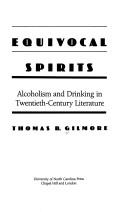Check nearby libraries
Buy this book

"Of the eight American Nobel Prize winners in literature, three--Sinclair Lewis, Eugene O'Neill and William Faulkner--were alcoholic drinkers, and two--Ernest Hemingway and John Steinbeck--were hard drinkers. Almost all critical comment about these writers has treated their drinking habits a somehow separate from their work. Thomas Gilmore argues that the result is neither good biography nor good literary criticism. He shows how the drinking and the work can each shed light on the other. Although readers and critics acknowledge that many modern writers tend to be heavy drinkers, [title] is the first full-length study of drinking as it is depicted in literature, both by writers who have had drinking problems and those who have not. This interdisciplinary study of science and literature explores the ways scientific knowledge of alcoholism may enlighten the reader as well as the means by which literature may confirm, intensify, dramatize, extend, and occasionally even challenge empirical studies. Examining the work of Malcom Lowry, Evelyn Waugh, Eugene O'Neill, John Cheever, Saul BEllow, F. Scot Fitzgerald, John Berryman, Kingsley Amis, and George Orwell, Gilmore evaluates the major genres of modern literature--drama, poetry, the short story, the novel--for the distinctive portrayals of drinking or alcoholism. He argues that good literature resists stereotyping the alcoholic and portrays instead a figure divided into a welter of conflicting feelings. Gilmore shows that literature conveys the complex struggle in a fictional character or in a real person in a way that science--which must be diagnostic, analytical, and objective--cannot."--Cover [p. 4].
Check nearby libraries
Buy this book

Previews available in: English
Subjects
History and criticism, Alcoholism in literature, Drinking of alcoholic beverages in literature, Littérature américaine, Alcoholics in literature, American literature, Consommation d'alcool dans la littérature, Histoire et critique, Roman anglais, Drinking customs in literature, Literature, Alcoolisme dans la littérature, English fiction, Alcooliques dans la littérature, Criticism and interpretation, Alcoholism, Drinking in literature, Literature, history and criticismTimes
20th centuryShowing 1 featured edition. View all 1 editions?
| Edition | Availability |
|---|---|
|
1
Equivocal spirits: alcoholism and drinking in twentieth-century literature
1987, University of North Carolina Press
in English
0807817260 9780807817261
|
aaaa
Libraries near you:
WorldCat
|
Book Details
Edition Notes
Bibliography: p. [201]-216.
Includes index.
Classifications
The Physical Object
ID Numbers
Community Reviews (0)
Feedback?History
- Created April 1, 2008
- 14 revisions
Wikipedia citation
×CloseCopy and paste this code into your Wikipedia page. Need help?
| July 21, 2024 | Edited by MARC Bot | import existing book |
| December 11, 2023 | Edited by MARC Bot | import existing book |
| November 4, 2020 | Edited by MARC Bot | import existing book |
| October 12, 2020 | Edited by ImportBot | import existing book |
| April 1, 2008 | Created by an anonymous user | Imported from Scriblio MARC record |











